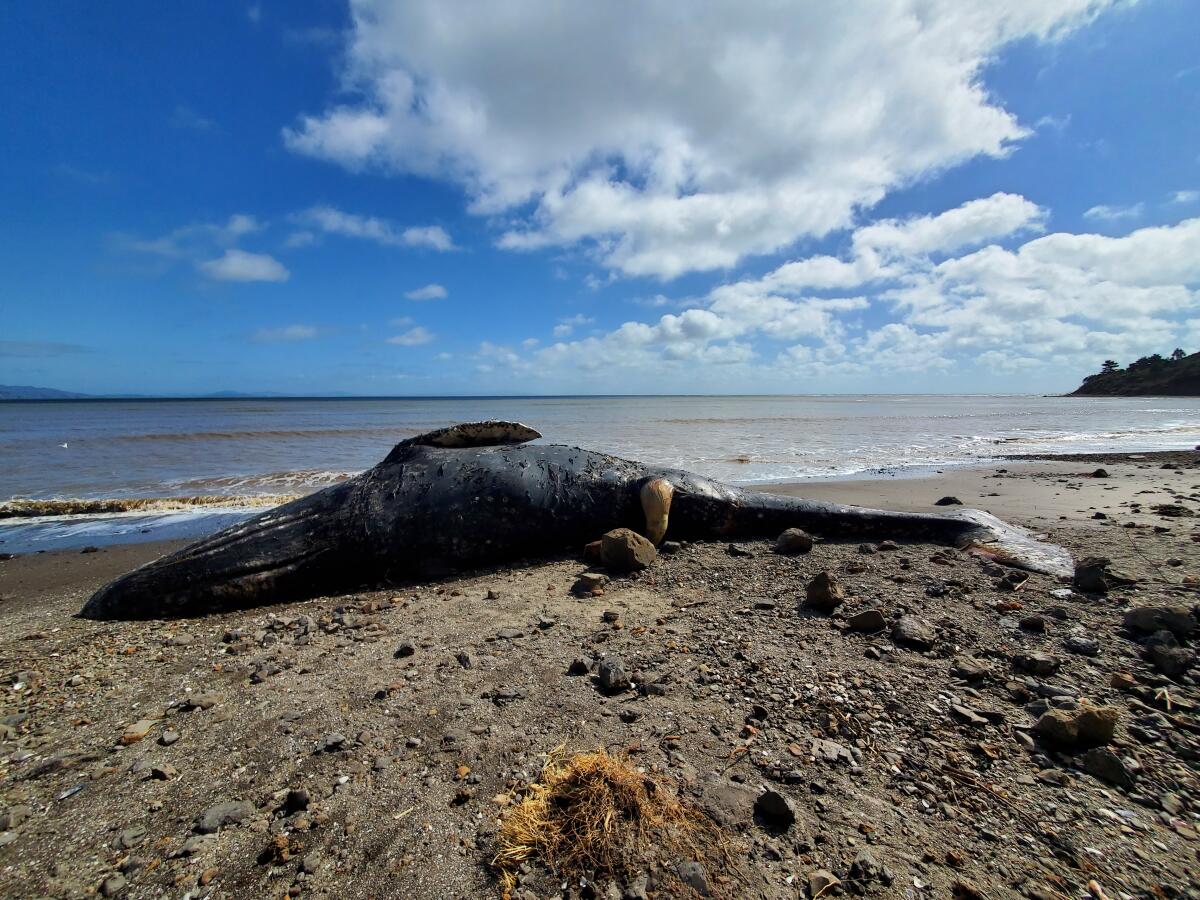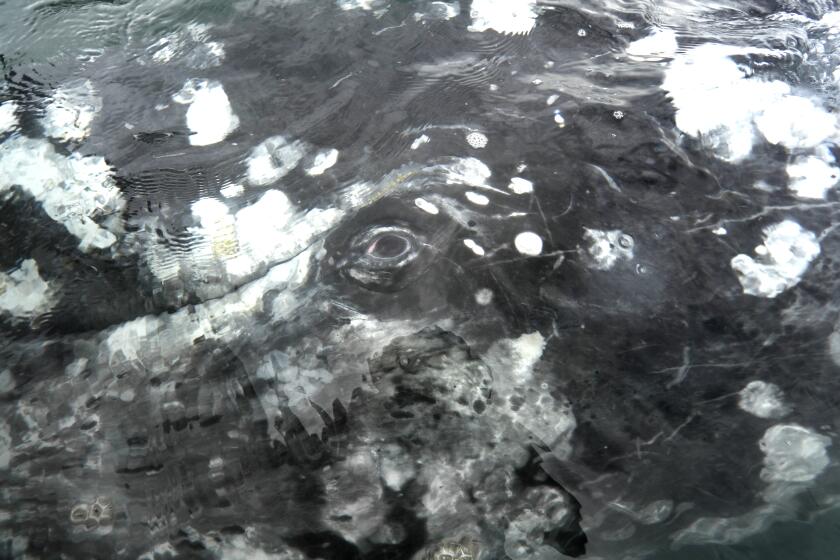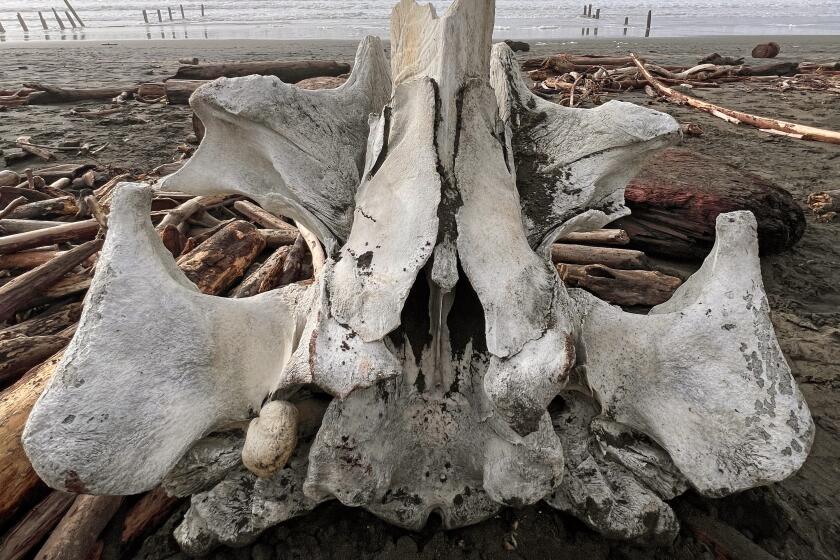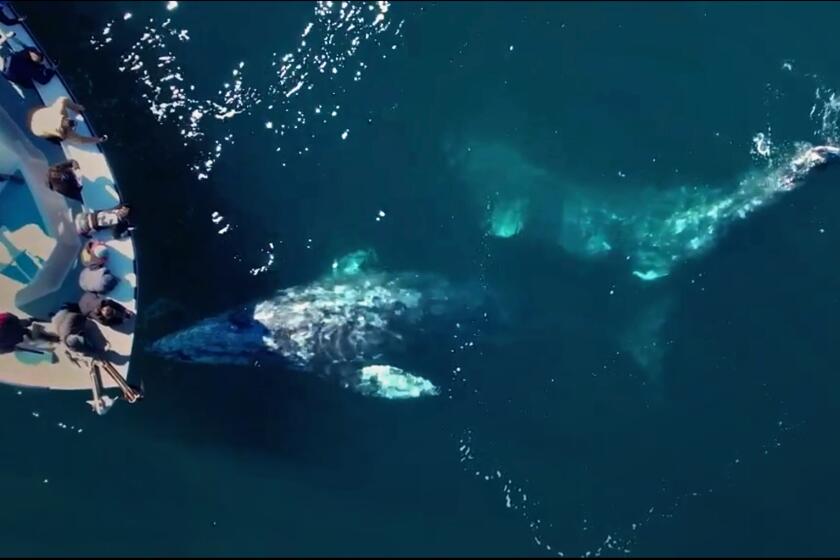First dead gray whale of 2023 washes up on California beach; scientists concerned about trend

- Share via
A 35-foot gray whale washed up on the shore of a Bay Area beach late last month — the first such fatality in the region this year — adding to the concern scientists have over the health of the species.
The whale likely died of injuries after crashing into a boat, according to scientists with the Marine Mammal Center in Sausalito, Calif., who conducted a necropsy last month.
The team was alerted to the dead whale found washed up on Bolinas Beach east of Duxbury Point in Marin County on March 23 — likely the day the whale died, according to a press release from the Marine Mammal Center.
The whale’s death is the latest in a concerning trend in recent years, which prompted the National Oceanic and Atmospheric Administration in 2019 to declare an “unusual mortality event” for the species living and migrating along North America’s Pacific Coast, after an alarming number of gray whales began washing up along the shores from Mexico to Alaska.
“Gray whales are ocean sentinels due to their adaptability and foraging habits. They have a lot to tell us about the health of the ocean, so to see the species continue to face the added threats of human interaction should concern all of us,” Pádraig Duignan, director of pathology at the Marine Mammal Center said in a statement. “This case reinforces the need for us to continue to perform both observational research of live whales as well as necropsy investigations so that this critical data can be shared with key decision-makers to find actionable solutions.”
The number of gray whale calves born last year was the lowest since 1994, when scientists started recording the data, according to a report Friday.
The whale found in late March was identified as a 35-foot sub-adult male, meaning it still hadn’t reached its full size. The necropsy found bruising and hemorrhage in the soft tissue on the left side of the whale’s head, which officials called signs of blunt force trauma “consistent with vessel collision,” the statement said. However, the researchers noted the whale appeared otherwise in normal condition based on the fat stores and blubber layer — not malnourished, as has been the case for most of the whales found stranded on beaches in recent years.
Scientists are hopeful the dead whale’s otherwise good health could be an indicator that the species is doing better compared with recent years, when population numbers have fallen drastically and birth rates have dropped.
A large, heavy bone was found on a beach in the Bay Area over the weekend. Experts believe it belonged to a gray whale.
“It was a relief to see this young male gray whale in such good body condition with a thick layer of blubber and lots of fat and oil,” said Moe Flannery, senior collections manager of ornithology and mammalogy at the California Academy of Sciences, which assisted with the necropsy.
Since this season’s first sighting of a gray whale drew headlines Feb. 8, the center has documented at least four other live gray whale sightings in the Bay Area, the statement said.
Each year, gray whales migrate from the warm, protected lagoons of Mexico’s Baja Peninsula to the cold waters of the Arctic, where they feed for months before returning to the warmer waterways, to mate, give birth and nurse their calves.
It’s a 12,000-mile round-trip migration that leads through shipping lanes, near fishing or tourist boats and occasionally into jaws of hungry orcas. Gray whales are currently migrating north to their traditional feeding grounds in the Arctic waters, the center said.
The bulk of the whales found beached since 2019 have been malnourished, but the other two leading causes of death have been getting entangled in fishing line or trauma after vessel strikes, according to the center.
Passengers on a whale-watching excursion Monday morning near Oxnard got an up-close-and-personal look at a pair of gray whales.
Seven gray whales and three humpbacks were found dead on Bay Area beaches in 2022, according to the center.
The California Department of Fish and Wildlife recently decided to prohibit commercial Dungeness crabbing off much of its coast in an effort to protect humpback whales after recording several entanglements last spring. The change will take effect April 15, stretching from the Sonoma County/Mendocino County area to the U.S.-Mexico border.
More to Read
Sign up for Essential California
The most important California stories and recommendations in your inbox every morning.
You may occasionally receive promotional content from the Los Angeles Times.














